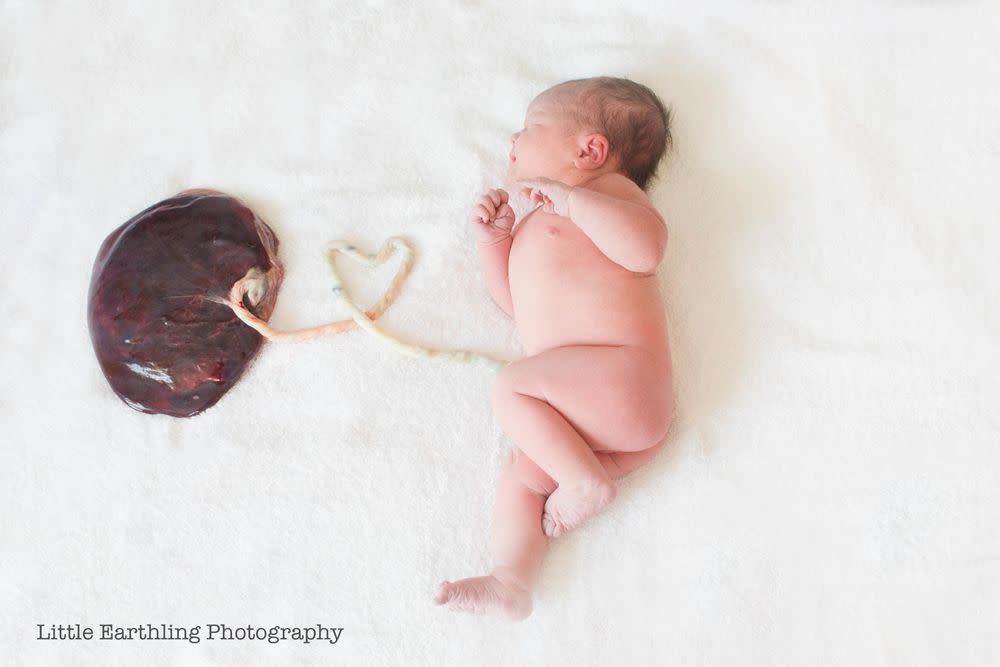The Risks of Eating the Placenta

Thanks to a vocal group of new celebrity moms, placenta eating has gone from an old-school bit of Chinese medicine (dried placenta is used in some remedies crafted by Chinese herbalists) to a mainstream health topic. Proponents cite a host of benefits attributed to ingesting the placenta, including faster healing after childbirth, improved energy levels, boosted milk production, and decreased risk of postpartum depression.
But even though this piece of tissue comes directly from inside your own body, there could be some real risks to eating the placenta. Think about these concerns before you take a bite.
RELATED: Placenta: Your Baby's Lifeline
The placenta serves as a filter, keeping dangerous waste away from your baby. But some waste could still be contained in the placenta after childbirth. "While the placenta is in utero, it's almost like a filter, filtering out things the baby shouldn't get, including bacteria – and then you're going to ingest it," says Titi Otunla, a certified nurse midwife at Texas Children's Pavilion for Women in Houston. "It doesn't sound right."
And let's face it: Even if you deliver in a germ-conscious hospital, the birth process involves an awful lot of bodily fluids and chances for contamination. "The placenta can become infected, and the vagina isn't sterile either," says Marra Francis, M.D., an Ob-Gyn in Woodlands, Texas, and an author of the Mommy MD Guides. "Women often defecate during labor, and there's even more bacteria in feces, which can contaminate the placenta during birth. Why would you want to risk introducing these infectious agents back into you?"
You probably wouldn't eat a steak that's been left out on a counter all day, right? Unless you bring a cooler and ice with you when you go into labor, you may not have access to proper refrigeration fast enough to preserve the placenta. "You'll need to make sure someone comes within an hour or two and takes it home to a freezer or refrigerator," Otunla says.
"Any infection in your blood lives in your placenta, so you're taking a risk ingesting that – especially if you're eating other people's placentas, or sharing your own with friends and family," Dr. Francis says. "Unless you know how to properly handle biohazards, you're going to put yourself at risk."
Most moms today don't take a bite of the raw placenta; it's often cooked and either dehydrated and ground into a powder that's placed in pill capsules, or frozen and used in fruit smoothies. But many of these processes, especially cooking, can damage the very nutrients you're hoping to receive. "You have to cook at sterilization levels, and at that point, you've denatured all of the proteins and the hormones that you think are going to help you heal," Dr. Francis says. "You have to cook at such high levels to kill bacteria that you will kill everything you think is good, too."
Placentas are rich in blood, lending it a coppery, gamey flavor. Chefs who have cooked it, like Daniel Patterson of Coi and several other San Francisco restaurants, compare it to squab. Others suggest it's like liver, and a few compare it to chicken. In any case, you may be doing a whole lot of prep for a less-than-stellar eating experience.
A 2016 report from the Centers for Disease Control and Prevention (CDC) details a case involving a baby who was born healthy and without complications, but soon developed respiratory issues. When doctors examined the baby, they discovered the presence of B Streptococcus agalactiae (GBS) bacteremia, a dangerous blood infection also known as group B strep. Eventually doctors linked the baby's infection to placenta eating; the mother was consuming it in capsule form, and she appeared to pass the infection along to the baby while breastfeeding. The team examined the placenta capsules and confirmed this link: The pills were full of GBS, which can cause babies to develop sepsis (infection of the blood), pneumonia (infection in the lungs), and meningitis (infection of the fluid and lining around the brain). While this is a rare case, mothers should still take caution when dealing with Baby’s health.

